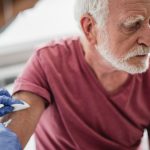
A single psychedelic trip with psilocybin — the mind-altering component of magic mushrooms — appears to lift the fog of major depression in some hard-to-treat patients, a new clinical trial reports. A 25-milligram dose of a synthetic psilocybin compound called COMP360 caused a “rapid and durable response” in more than a third of patients suffering from treatment-resistant depression, said Dr. Steve Levine, senior vice president of patient access for the London-based pharmaceutical company COMPASS Pathways. It focuses on psilocybin research and created the COMP360 synthetic compound and funded the clinical trial. The results occurred in a phase 2 trial aimed at finding the most effective dose of COMP360, according to a report published Nov. 3 in the New England Journal of Medicine. However, there was one caveat: While side effects were minimal, four patients (out of 79) who took the highest dose either reported having suicidal thoughts or intentionally harming themselves in the weeks that followed. The psilocybin compound will now proceed to a full-fledged clinical trial that promises to be the largest ever conducted for a psychedelic compound, Levine said. The trial testing its effectiveness is expected to include more than 900 people in 14 countries, including the United States, Levine said. It’s expected to conclude in mid-2025. These early findings show that psilocybin could well provide an alternative to standard treatments for major… read on > read on >














